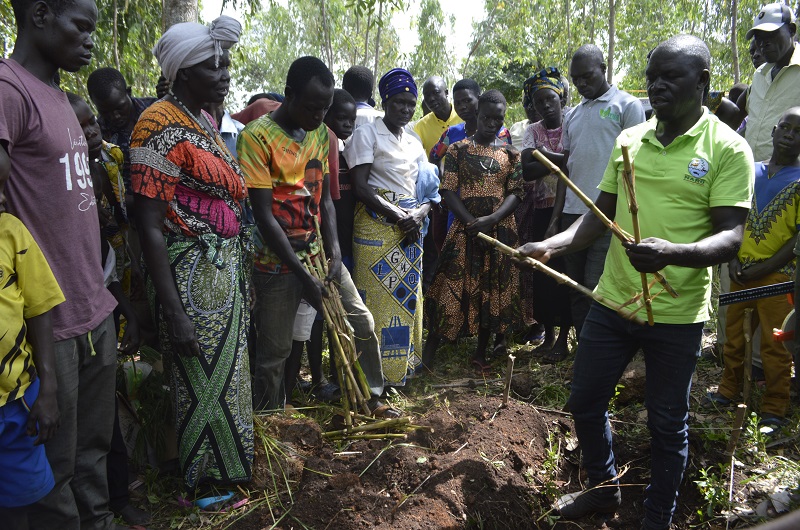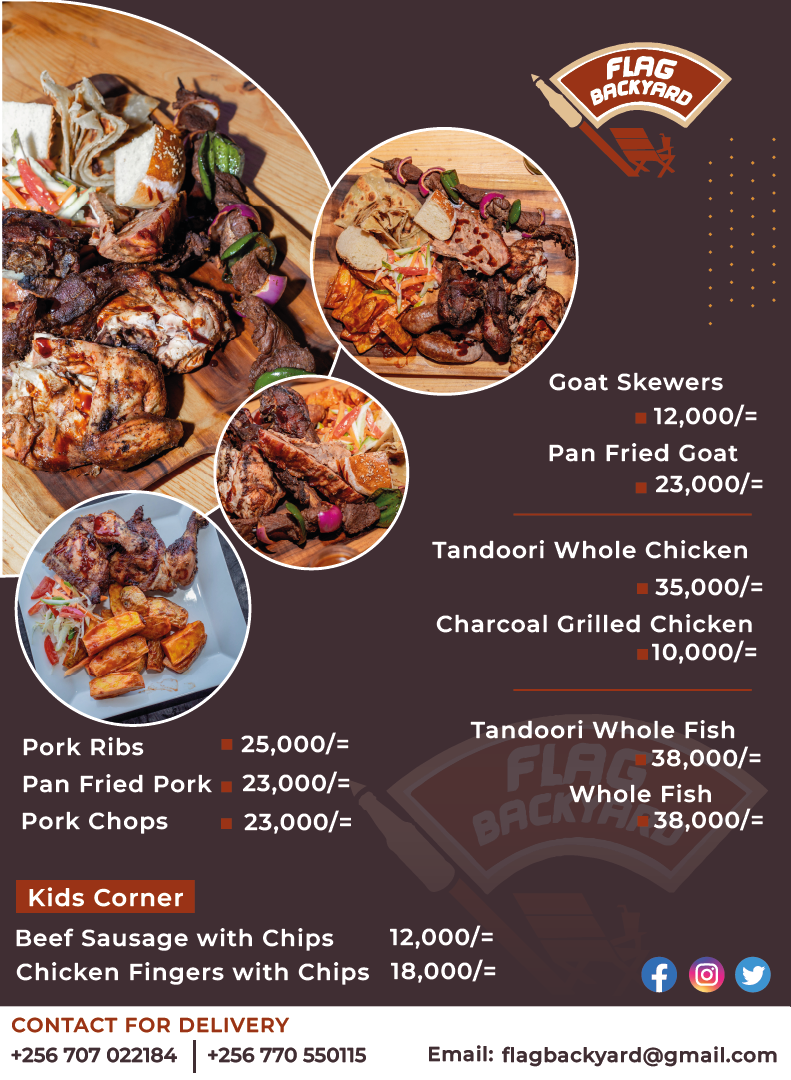
Yumbe, Terego farmers tipped on Conservation Agriculture
- AgricultureFEATUREDNEWSUPCOUNTRY NEWS
- December 1, 2023
- No Comment
By Andrew Cohen Amvesi
YUMBE. Over 500 farmers in Yumbe and Terego districts in the West Nile region have acquired knowledge on conservation agriculture.
The farmers drawn from the sub-counties of Drajini, Lodonga and Odravu in Yumbe district were joined by their neighboring colleagues of Odupi sub-county in Terego district to acquire conservation agricultural skills during the farmer-day held at Naku primary school in Drajini sub-county, Yumbe district on Thursday.

The training was organized by Wildlife Conservation Society (WCS) in collaboration with National Agricultural Research Organization (NARO) Abi Zonal Agricultural Research and Development Institute (ZARDI).
During the function, Dickson Egama, the soil fertility technician at Abi ZARDI took the farmers through the practical aspect of conservation agriculture in a bid to enhance their capacity to improve productivity in the community.

“We are teaching farmers about conservation agriculture and we think this being smart agricultural practice, it can change the landscape of farming in this community. Right now, we have a lot of challenges relating to soil degradation, we also have issues of deforestation, so there are so many challenges that are surrounding agriculture in the zone; soil erosion is also increasing. With all these in the background, we think if we promote conservation agriculture, this is going to do a lot,” Egama said shortly after the training.

“When you are practicing conservation agriculture, we are focusing on no till; you don’t dig the land but you only use planting basins and holes that we are making to plant crops. So, that means you are not disturbing the soil, you are not digging the whole land, you are only slashing the land and then you make holes in which you plant. Then after slashing the land and making the holes, we also apply manure. Besides manure, we can also micro-dose fertilizer; put fertilizers in smaller quantities only in the planting basins. After planting we mulch the whole of the site,” Egama explained.
He said through mulching, they are conserving moisture and also cutting the cost of the first and second weeding.
“One of the challenges we know the farmers experience in mulching is the inadequacy of the materials for mulching and we are promoting vetiver grass within these fields to provide materials within the sites. The farmer doesn’t have to go to another place to ferry materials or to buy grass for mulching which is very expensive,” Egama stated.

He said besides the planting basins and grass for mulching, they are also teaching farmers on soil and water conservation practices.
“In this, we are particularly promoting We Fanya Chini, We Fanya Ju practices. These are trenches we construct upslope (in the Fanya Chini) to capture runoff. We harvest a lot of runoff water, in a trench of 60cm deep, 60cm wide, 300cm long, we harvest up to 1000 liters of water which is a lot of water harvested. Then in the Fanya Ju, we stabilize the bands with vetiver grass, so we are trying to minimize soil loss and we don’t want any residue to leave the garden, you have to continuously recycle them,” Egama said.
He observed that they are equally promoting integration of different crops to ensure diversity within the field where trees and grasses are within the crop land.
Egama believes that if farmers can adopt the new practices, they will greatly improve yield in their fields and also conserve the environment.

Natal Acidri, a resident of Awindiri village in Drajini sub-county said the knowledge they have acquired has come at the time they have been realizing low yield due to the traditional farming practices.
“Now with the skills I have acquired about mulching, soil and water conservation, I will go back to put this knowledge in practice. I intend to increase my plantations from one to two quarters each for rice, beans and maize this time round using the knowledge I have got here,” Acidri promised.
Sentina Maliko, another beneficiary from Olea village in Odupi sub-county said this is the second time she is attending conservation agriculture practical lectures being conducted by Abi ZARDI staff.
Maliko noted that during the first teaching, she was given 25kgs of bean seeds which she planted and managed to get four and a half basins of harvest.
“That to me is better than what I used to get. This time round, I want to buy 50ks of beans from Abi ZARDI and I’m sure with the skills I have acquired, I will be able to get many sacks of beans at the time of harvest,” Maliko said.
Amiza Andruga, the Odravu sub-county Agriculture Officer appreciated the organizers of the training for empowering farmers with the modern agricultural practices.
“This training where water conservation systems are put in place like the Fanya Chini and Fanya Ju, then issues like getting the permanent basins, I think these will solve some of the problems like the nutrients which were getting lost through soil erosion can be controlled and eventually, also use of manure in the garden by use of mulches. I think these are some of the practices farmers should adopt to improve on yield,” Andruga said.
In his remarks, Simon Amoko, the WCS project officer for West Nile region said the training was to mark the farmer field day which is very crucial in agricultural extension, mainly to educate the farmers and create access for farmers to inputs and link them to experts so that their issues in farming that have not been addressed for a very long time can be addressed by the experts.
“This day also brings people from agro-input dealers on board so that farmers can know what type of seed they can find where, and this is important in terms of increasing yield because farmers would assess quality seeds and these seeds when you plant them, you can increase yield. That can result in food security at household level but also this will help the farmers to put money in their pockets to address other needs,” Amoko explained.
He said the farmer field day is one of the broader extension approaches that is not easy to organize because it involves a lot of resources that need to be put in place.
“But as WCS, we want to reach the last farmer in the village, so because of that, now we thought we could organize these farmers in one day event whereby they can come and air out their challenges in their farming operations and experts that we bring from NARO, from the districts and from sub-counties can now answer their questions well,” Amoko emphasized.
According to Clement Peace Ejua, a research officer heading the program of technology promotion and outreach at Abi ZARDI, in these episodes of real climate change affecting the farmers’ production and productivity, there is deliberate effort by NARO at Abi ZARDI to promote climate resilient and nutrient enhanced technologies accessible and affordable to farmers.
He said that is why varieties of Maize Longe 5D, Narobean 1, 2 and 3 are being promoted in the host communities and refugee hosting districts.



